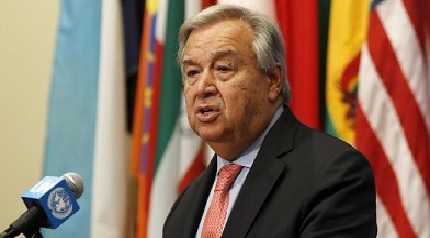
UNITED NATIONS, April 13 (Xinhua) -- UN Secretary-General Antonio Guterres on Wednesday called for action to mitigate the global impact of the Russia-Ukraine conflict on food, energy and finance systems.
The conflict is supercharging a three-dimensional crisis of food, energy and finance that is pummeling some of the world's most vulnerable people, countries and economies, he said at the launch of a report by the Global Crisis Response Group on Food, Energy and Finance over the Ukraine crisis.
"And all this comes at a time when developing countries are already struggling with a slate of challenges not of their making: the COVID-19 pandemic, climate change and a lack of access to adequate resources to finance the recovery in the context of persistent and growing inequalities," he said. "We are now facing a perfect storm that threatens to devastate the economies of many developing countries."
The report shows that the impact of the Ukraine crisis is global and systemic, said Guterres.
As many as 1.7 billion people, one-third of whom are already living in poverty, are now highly exposed to disruptions in food, energy and finance systems that are triggering increases in poverty and hunger, he said.
Thirty-six countries count on Russia and Ukraine for more than half of their wheat imports, including some of the poorest and most vulnerable countries of the world. Food prices were already on the rise. But the Ukraine crisis has made a bad situation far worse. At the same time, Russia is a top energy supplier. Oil prices are up more than 60 percent over the past year. The same goes for natural gas prices, which have risen by 50 percent in recent months. And fertilizer prices have more than doubled, he noted.
"As prices climb, so does hunger and malnutrition, especially for young children. Inflation is rising, purchasing power is eroding, growth prospects are shrinking, and development is being stalled and in some cases, gains are receding. Many developing economies are drowning in debt, with bond yields already on the rise since last September, leading now to increased risk premiums and exchange rate pressures," he said. "This is setting in motion a potential vicious circle of inflation and stagnation -- the so-called stagflation."
The report also shows that there is a direct correlation between rising food prices and social and political instability, he warned.
Guterres called for open markets and the lifting of unnecessary export restrictions to ensure a steady flow of food and energy. There is also a need to direct surpluses and reserves to those in need and to keep a lid on food prices and calm the volatility in food markets.
He called on countries to use this crisis as an opportunity to work toward progressively phasing out coal and other fossil fuels, and accelerating the deployment of renewable energy and a just transition.
Guterres stressed the need to pull developing countries back from the financial brink.
Funds must be made available to economies that need them most so that governments can avoid default, provide social safety nets for the poorest and most vulnerable, and continue to make critical investments in sustainable development, he said.
He called for an end to the conflict in Ukraine.
"The people of Ukraine cannot bear the violence being inflicted on them. And the most vulnerable people around the globe cannot become collateral damage in yet another disaster for which they bear no responsibility. We need to silence the guns and accelerate negotiations toward peace -- now."
The report, "Global Impact of War in Ukraine on Food, Energy and Finance Systems," is the first product by the Global Crisis Response Group that Guterres established in March 2022.




